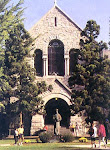So it is week 4 of the semester, and as we dig out from the snow, it might be a good time to remind ourselves why we take on this onerous task of teaching. Cultivating our own best practices improves student learning, and reflecting on our own goals can help students articulate theirs. The links you will find below are all part of national efforts to develop stated, attainable, and assessable goals for best practices in undergraduate liberal education. A bit of information follows each link.
Many people on campus know that we are currently involved in a Teagle Foundation cross-campus study on teaching and diversity. However, the Teagle does much more.
The Teagle Foundation, according to its mission statement,
"provides leadership for liberal education, marshalling the intellectual and financial resources necessary to ensure that today's students have access to challenging, wide-ranging, and enriching college educations. We believe that the benefits of such learning last for a lifetime and are best achieved when colleges develop broad and intellectually stimulating curricula, engage their students in active learning, explore questions of deep social and personal significance, set clear goals, and—crucially—systematically measure progress toward them."
The last part of that sentence is, indeed, "crucial." In browsing around the Teagle web site, I've been impressed by the movement toward action that marks all their activities--discussions move to publications, publications to campus action, campus action back to cross- and inter-campus discussion. From what I have read so far, their materials are of a high quality, well-written, stimulating, and refreshingly free of jargon. The questions they grapple with are the ones we struggle with daily: what is the purpose of a liberal arts education? how can we advance student learning so that all students can be as empowered as possible? how can we use the unique qualities of the small college environment to advance student learning, yet encourage students to make connections to the larger world?
Here are some selections from their site:
The National Forum on the Future of Liberal Education, a three-year series of workshops on (guess what?) the future of liberal education
Here's a link to the Teagle White Papers, including a new one on civic engagement.
Note: you must download these documents from the White Paper link.
You may also wish to examine the LEAP (Liberal Education and America's Promise) blog--written by guest bloggers from educational institutions around the country. It is dedicated to a reflective discussion about "'liberal education' - how it is changing, why it is so important in today's world, and what people are saying about it around the country and the world.
There are also some forthcoming conferences you might find interesting, two of which are just down the road in Philadelphia:
Faculty Roles in High-Impact Practices, 25-27 March 2010, Philadelphia (Hyatt Regency Penn's Landing), sponsored by the American Association of Colleges and Universities. From their web site:
The conference calls attention to "high-impact practices"--including undergraduate research, service-learning, first-year and capstone projects/programs, and learning communities—that by their nature require students to be actively involved in their own learning. This conferences brings together "faculty members seeking innovative, robust, and practical designs for learning, teaching, and assessment approaches proven to deepen student engagement, and a network of engaged colleagues" and "administrators and others on campus looking to support and partner with faculty to advance the use of high-impact practices" throughout their campus communities.
Highlights include a Keynote on "Academic Excellence and Civic Engagement: Constructing a Third Space for Higher Education," and (my favorite title so far): "How Teachers Need to Deal with the Seen, the Unseen, the Improbable, and the Nearly Imponderable." Reading the AAC&U's discussion of "high-impact teaching practices," I'm struck by how nay of these we are already doing. The conference sounds like a great opportunity to learn how faculty at other institutions are engaging with similar questions, and to share what we have gleaned with the larger educational community.
Deadline for registration: March 1.
The AAC&U is also sponsoring the 20th anniversary meeting of the Institute on General Education and Assessment, 40-9 June 2010 (at U of Vermont-Burlington). The Institute focuses on helping institutions develop clear, coherent goals for general education, and includes a special emphasis on assessment. The deadline for this one is coming up soon!: February 19, 2010.
Greater Expectations Institute, 15-18 June 2010 (Vanderbilt U, Nashville TN)
aims to make teaching excellence inclusive, as colleges help "prepare far more Americans for success in a globally interdependent society." This institute underscores efforts to "make excellence inclusive," focusing particularly on underserved populations--students of color, of low-income backgrounds, of the first generation of their families to attend college. Given the changing demographic of American college students and our historic commitment to egalitarian education, Ursinus faculty might find this institute very productive. Deadline for team application submission: March 12, 2010.
Engaging Departments Institute, 7-11 July 2010, Philadelphia. The Institute "offers campus teams intensive, structured time to advance plans to foster, assess, and improve student learning within departments and acorss the institution." Bringing together teams of deans, department chairs and faculty members in collaboration, it aims to "advance integrative and engaged learning across disciplines." Deadline for team application: March 19, 2010.
Subscribe to:
Post Comments (Atom)

No comments:
Post a Comment